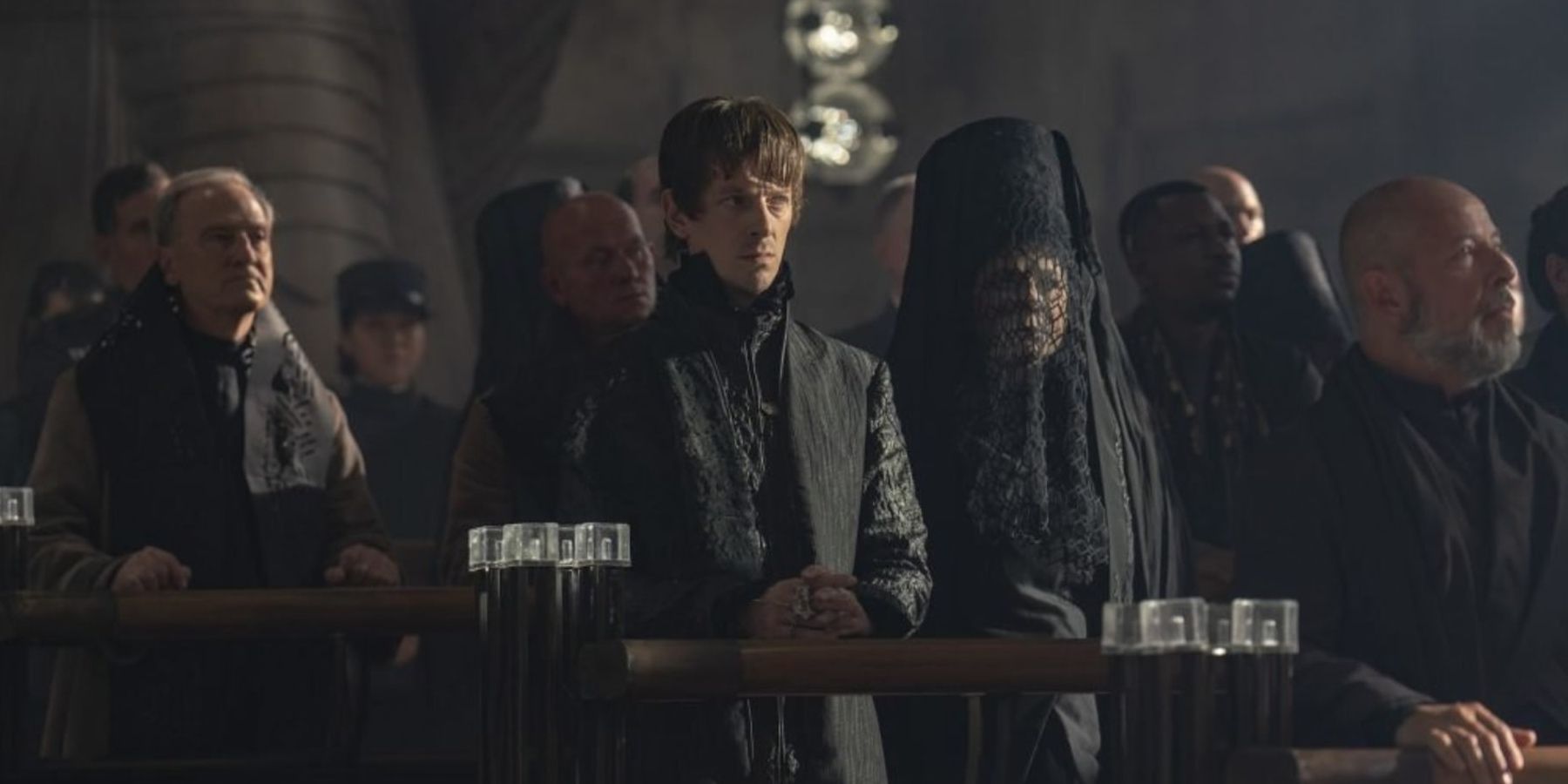Games
Dune: Prophecy – The Plot Against the Landsraad, Explained

Summary
Table of Contents
- Rebel plot to attack Landsraad foiled by Desmond Hart’s deadly powers.
- Rebels hoped to control spice trade for the people through violent means.
- Uncertain if rebellion will continue after failed attempt, facing powerful enemies.
In Dune: Prophecy episode four, “Twice Born,” one of the plot threads that had been building all season finally came to a head. For a few episodes, audiences had been given hints of a growing rebel plot to topple the great houses and return the power of Spice to the people, and in “Twice Born,” we got to see that plot play out. Suffice it to say, it didn’t go very well.
The plotters were uncovered and punished by Desmond Hart (Travis Fimmel), the former soldier with some pretty deadly powers up his sleeve. This act foiled not just the rebellion, but also the machinations of Valya Harkonnen (Emily Watson), who planned to use the rebel attack as an avenue back into Emperor Corrino’s (Mark Strong) good graces. But what was behind the attack, and just what were the rebels hoping to do?
Related
Dune: Prophecy – What’s With the Whales?
A look at one of the strangest details in the Dune prequel series.
The Landsraad
The rebels’ plot involved the use of a contraband “thinking machine” outfitted with an explosive device that would hopefully take out the entire governing body of the great houses, called the Landsraad. The Landsraad is a sort of consortium of the various dukes and barons who together control essentially all the wealth in the galaxy, most of which comes from the Spice trade. It is an opportunity for the various great houses to meet and discuss business affairs as well as air grievances, as the newly initiated Baron Harkonnen (Edward Davis) attempts to do concerning the mysterious death of young Pruwet Richese.
In short, it’s a pretty good spot to hit if you want to do some damage to the existing power structure. The rebels see the Landsraat meeting as an opportunity to take out many of their biggest targets in one fell swoop, hoping to cause enough damage to the great houses to move in and gain control of the Spice trade, redirecting its riches to the people rather than the aristocracy. Their “man on the inside” is Keiran Atreides, House Corrino’s Swordmaster who’s been conducting a secret affair with the emperor’s daughter Ynez while pulling double duty as a rebel spy. The plan was for Keiran to plant a bomb in the room where the meeting was taking place and then get out of dodge before it went off.
Unfortunately, that’s not how things turned out. Desmond Hart discovers that the rebels are planning to use a thinking machine to carry out their plan, and orders some of the imperial soldiers to go out and crack down on any use of the illegal technology. This leads the soldiers to find some of the plotters, including Keiran’s friend Horace (Sam Spruell, quite a bit different from his Fargo season 5 role) capturing them and bringing them to the meeting for Hart’s big power play. In front of the whole Landsraad, Hart uses his powers to murder the conspirators, as well as Lord Hagal (Callum Coates) who is found to also be using thinking machines. Hart also admits to murdering Pruwet, but takes a hard line that preventing the spread of thinking machines is paramount.
The Rebels’ Doomed Plot
Though their attempt to take out the Landsraad ultimately failed, it’s unclear whether or not the rebellion will continue. Keiran survived the attack, and it seems that the emperor does not suspect that his Swordmaster is a spy. Other conspirators like the Fremen bartender Mikaela (Shalom Brune-Franklin), who is also working with the Sisterhood, remain undiscovered, so it’s entirely possible that the rebellion will mount another attack at some point. If they do, they’ll have to confront a very powerful enemy in the form of Desmond Hart.
Rebellions are often ideals as much as organizations, and it’s likely that the web of influence that the rebels have goes deeper than what the series has shown so far. The showrunners haven’t given the audience an in-depth look at life in this universe on a ground level, focusing instead on the intrigue among the great houses, but it’s clear from the rebels that their society is one of great inequality. The Imperium is a classic oligarchy, where the wealthy control all of the resources and the regular people have little to no influence over their rulers. The rebel plot was an attempt to reclaim some of that power for the people through violent means.
Audiences who have seen the Dune movies know that the rebels ultimately aren’t able to topple the existing regime, as it appears it only grows stronger in the 10,000 years between Dune: Prophecy and the saga of Paul Atreides. As far as the Sisterhood is concerned, rebellions don’t really fit into their long-term plan to control the houses of power from behind the scenes, and their connection to this rebellion proves they’re willing to do whatever it takes to make sure things work out in their favor. Time will tell if the rebels’ attempts at upheaval are entirely fruitless, or whether they might be able to do some damage one way or another. 10,000 years is a pretty long time, after all.
-

 Movies4 weeks ago
Movies4 weeks agoColman Domingo Propels Phenomenally Entertaining “The Madness” | TV/Streaming
-

 Games4 weeks ago
Games4 weeks agoThe Hardest Regular Enemies In Final Fantasy
-

 Games4 weeks ago
Games4 weeks agoDragon Age: The Veilguard – Bloodbath Walkthrough
-

 Games4 weeks ago
Games4 weeks agoBest PP-919 Build in Black Ops 6 & Warzone
-

 Games4 weeks ago
Games4 weeks agoDisney Dreamlight Valley: How To Get A Stove
-

 Games4 weeks ago
Games4 weeks agoPokemon GO Primal Groudon Raid Guide | Counters, Weaknesses, Shiny Groudon & More
-

 Games4 weeks ago
Games4 weeks agoStalker 2: Should You Give Ward Sensors To Richter Or Captain Zotov?
-

 Games4 weeks ago
Games4 weeks agoFinal Fantasy 14 Mobile May Have a Hard Time Adapting an MMO Staple











